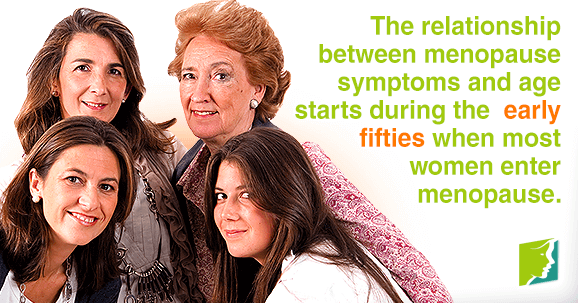Women experience menopause and premenopause symptoms differently. Some notice little change while others find that their daily lives become significantly affected. The age and physical fitness can greatly influence how the body responds to menopause symptoms.
Keep reading to learn more about the correlation between age and menopause.
How Are Menopause Symptoms and Age Related?
Generally, women won't start experiencing first menopause symptoms till their mid forties. It is not unheard of, however, for some women to find themselves entering menopause as early as their twenties (called premature menopause).
In fact, studies have successfully identified certain factors that may affect age at menopause onset, including reproductive history, dietary habits, weight gain or loss tendencies, and lifestyle patterns of physical activity, among others.
It is important to be aware that perimenopause can last up to ten years before a woman enters menopause (defined as 12 consecrations months without a period). The average of menopause in the United States is 51.
What Are the Most Common Menopause Symptoms?
Women approaching menopause are likely to experience some of these common menopause symptoms in a varying degrees of intensity.
- Hot flashes and sweating
- Mood swings
- Vaginal dryness and itching
- Sleep irregularities
- Hair thinning
- Irregular menstrual bleeding
- Loss of breast fullness
- Weight gain around the waist
- Change in sex drive
A woman's age when she goes through menopause is important because the body's condition determines how well it responds to the changes imposed upon it. However, there is no perfect age to go through menopause, instead every woman has her own moment of menopause genetically designed. Try to keep your body healthy and stress free at all ages so that it's always prepared. Keep reading to learn about menopause symptom treatments.
Relieving Menopause Symptoms
To keep the body in good condition keeping a healthy diet and exercise plan is a must. Walking, jogging, aerobics, and swimming are all great ways of keeping the body fit. Eating vegetables, fruits, and nutrients is also integral to maintaining a healthy body. Also, making other lifestyle changes like taking time to relax and do things you enjoy can help relieve stress.
Some women also find that alternative medicines can provide them with energy and moments of relaxation. Options to consider include acupuncture, herbal supplements, and aromatherapy.
If you are experiencing pain or feel that something is wrong, talk to your doctor. If your symptoms are not severe, you can also find natural solutions for menopause symptoms.
Sources
- BMJ Group. "Menopause: What is it?" Patient Leaflet. 2007.
- Hopkins, Virginia. Lee, John R. M.D. What Your Doctor May Not Tell You About Menopause. New York: Warner Books Inc., 1996.
- Love, Susan M.D. Menopause and Hormone Book. New York: Three Rivers Press, 2003.
- Martin, Raquel. The Estrogen Alternative. Rochester, VT: Healing Arts Press, 2000.
- Menopause. (2009). Dietary and lifestyle predictors of age at natural menopause and reproductive span in the Shanghai Women's Health Study. Retrieved September 22, 2020 from https://www.ncbi.nlm.nih.gov/pmc/articles/PMC2615483/




